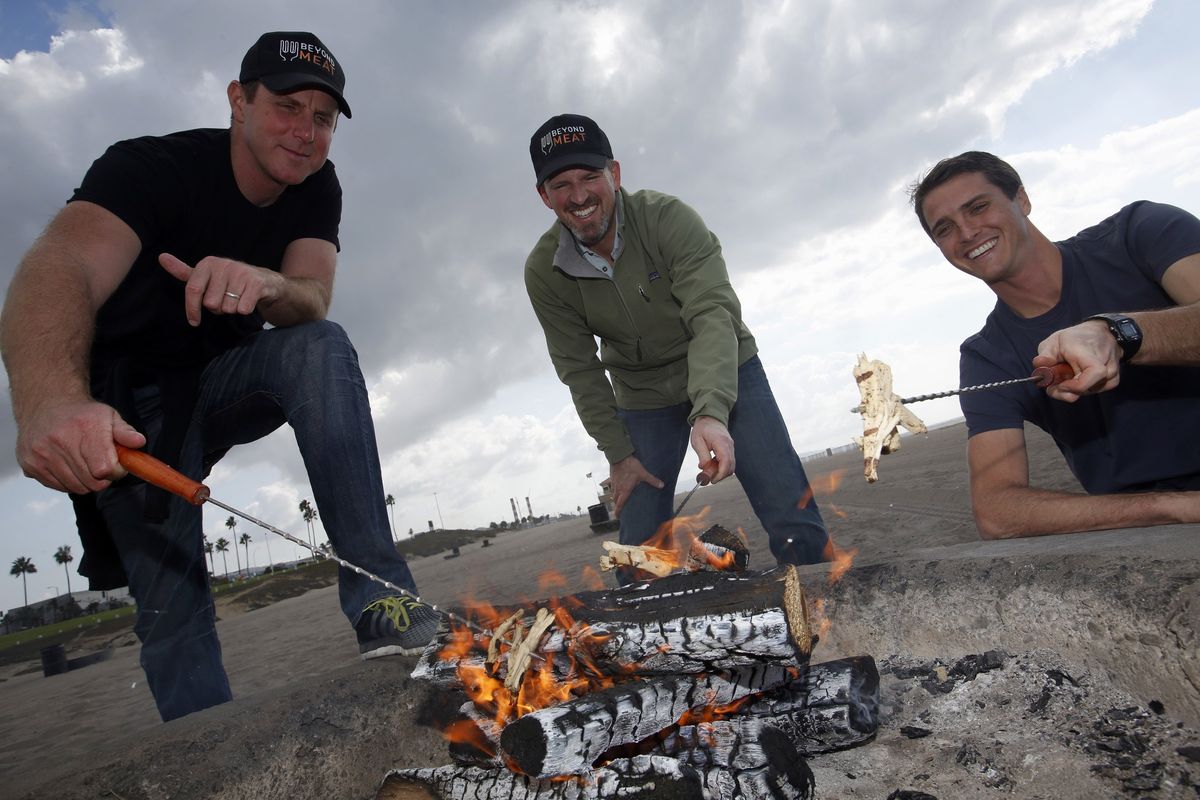Beyond Meat tries to recreate chicken’s texture, taste in vegetarian option

Ethan Brown held up one of his ready-to-eat vegetarian chicken strips and peeled off stringy strands that mimicked the moist meat of the real thing.
“That’s the beauty. That’s absolutely everything,” said Brown, founder of Beyond Meat, admiring the filaments of faux chicken at a cafe near the company’s Southern California headquarters.
The company gets close to creating that authentic but elusive texture by blasting soy and pea proteins through an alternating cascade of high heat and high pressure in a stainless steel machine.
The result is mock meat that replicates the genuine product enough to make people forget the tastes of springy tofu turkey, MSG-laden veggie burgers and plasticky facon – fake bacon, for the uninitiated.
So convincing is Brown’s imitation poultry that it has attracted investment from tech giants such as Microsoft Corp.’s Bill Gates, Twitter Inc. co-founders Biz Stone and Evan Williams, and venture capital firm Kleiner Perkins Caufield & Byers. Whole Foods Market helped refine the product before rolling it out at its stores last year.
“I thought they were just another boutique business selling overpriced products to well-heeled vegetarians at Whole Foods. But I was blown away when they came to meet me,” Stone said.
“They pitched really big thinking,” he said. “They said they weren’t just going after the meat market; they wanted to be meat. They said their competitors are the people who make chicken.”
Brown, who started out in the energy industry, sees mock meat not only as a much healthier alternative but also as a way to reduce methane and other harmful gases emitted by animals and to ease a meat shortage predicted to occur by midcentury.
Beyond Meat and other makers of such substitutes are chasing increasingly discerning palates by cooking up grub that captures more of the bite and appearance of animal flesh.
Match Meats of St. Louis, for instance, offers a line of vegan ground meat substitutes.
Field Roast of Seattle takes inspiration from traditional charcuterie to offer vegan products such as Wild Rice Cranberry Fig Roast En Croute and White Truffle Country Pate.
All are fighting for a piece of the meat-alternatives market, which has grown 8 percent from 2010 through last year to $553 million, according to research firm Mintel.
Brown doesn’t expect everyone to be a vegetarian. But he hopes enough people switch from animal protein to a plant-based version to make a difference in the long run.
“Things like (real) fried chicken taste great,” he said. “So why give it up? Just don’t have it every day.”
The effort to improve mock meat comes as studies warn that real meat may not be a sustainable source of protein.
The United Nations’ Food and Agriculture Organization projects global meat consumption will rise 73 percent by 2050, putting massive strains on the world’s water and grain supplies.
“Put simply, there’s no way to produce enough meat for 9 billion people,” the expected global population then, Gates wrote in a blog post titled “The Future of Food.” “Yet we can’t ask everyone to become vegetarians.”
Google Inc. co-founder Sergey Brin is one of the scientific and financial heavyweights looking for a solution. He spent $325,000 to fund a laboratory-grown hamburger developed by a Dutch scientist that was unveiled earlier this year.
Beyond Meat and others are betting on a shift in consumer attitudes. A Gallup poll last year placed the percentage of vegetarians in the U.S. at 5 percent, down slightly from 6 percent in 1999. The meat industry doesn’t expect that to change in the near future.
“While I know there are some amazing food scientists out there who can achieve great results, it’s hard for me to imagine that tofu or tempeh will compete with T-bones any time soon among people who enjoy the beefy taste and texture of a steak,” said Janet Riley, a spokeswoman for the American Meat Institute.
Brown, 42, agrees that his biggest challenge is recreating that experience.
“Man’s had a lot of time to screw around with meat and fire,” said Brown, who believes his product is about 80 percent of the way toward perfection. “We have more advanced technology at our disposal, but it’s still going to take a while.”